This was a night in Venice.
This was a night with one of the coolest artists in the scene.
This was a night with actress, singer and producer Jasmin Savoy Brown.
This was a night of talking with no filter about mental health, sexuality and having the right to discover yourself.
And this was a night dressed in Miu Miu, talking about the power that Miu Miu Women’s Tales gives to women, to artists, directors, actors, people in the industry that not only create art but speak about art and in doing so they create new networks, they create power.
This is a night of flashes in the narrow streets of Venice, a night where my mind opened in front of Jasmin, a woman who I would like to interview a thousand times more.
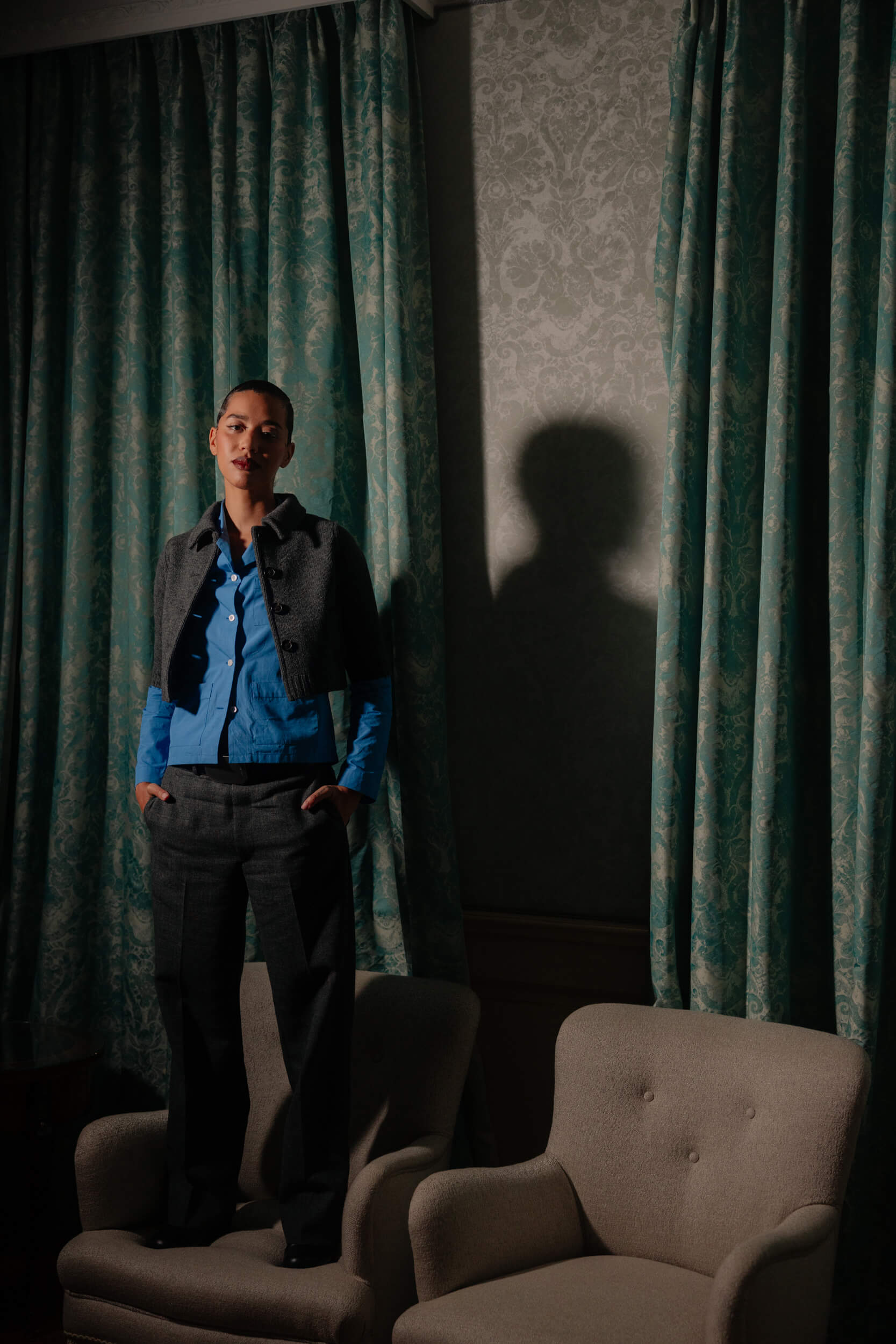
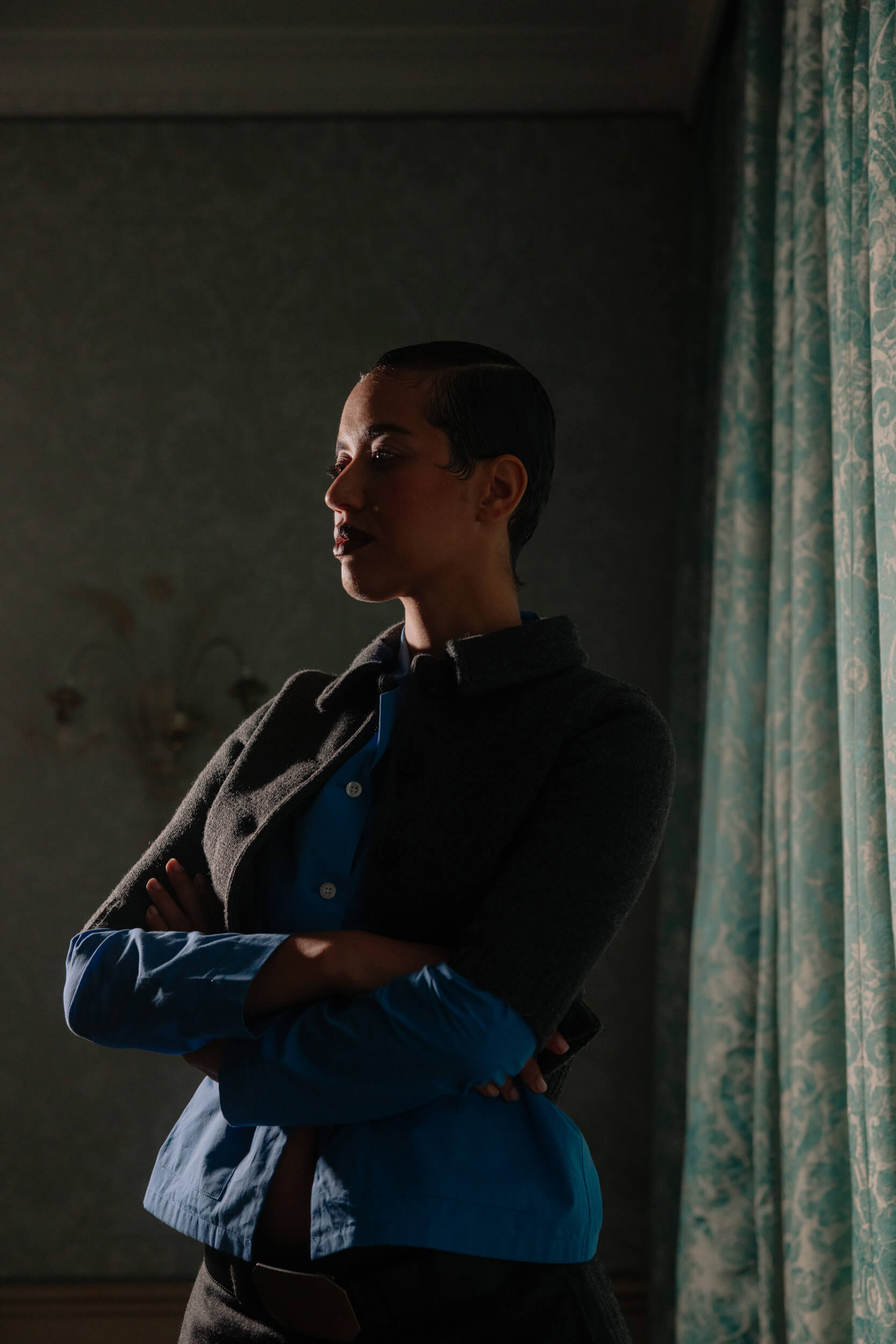
Actor, singer, producer. How do these different aspects of you represent and enrich who you are?
I love that question. I think that each thing that I do brings out a different part of me creatively. Acting, I get to explore something that someone else gives me. But when I write music, I’m doing the creating from scratch. There’s nowhere to hide when I’m writing a song, it’s fully me. And producing is kind of the combo of those two worlds, it’s like meeting someone where she is and where I am and creating something together, and I think it allows my inner child to come out and play but also the businesswoman, but also so many pieces of myself.
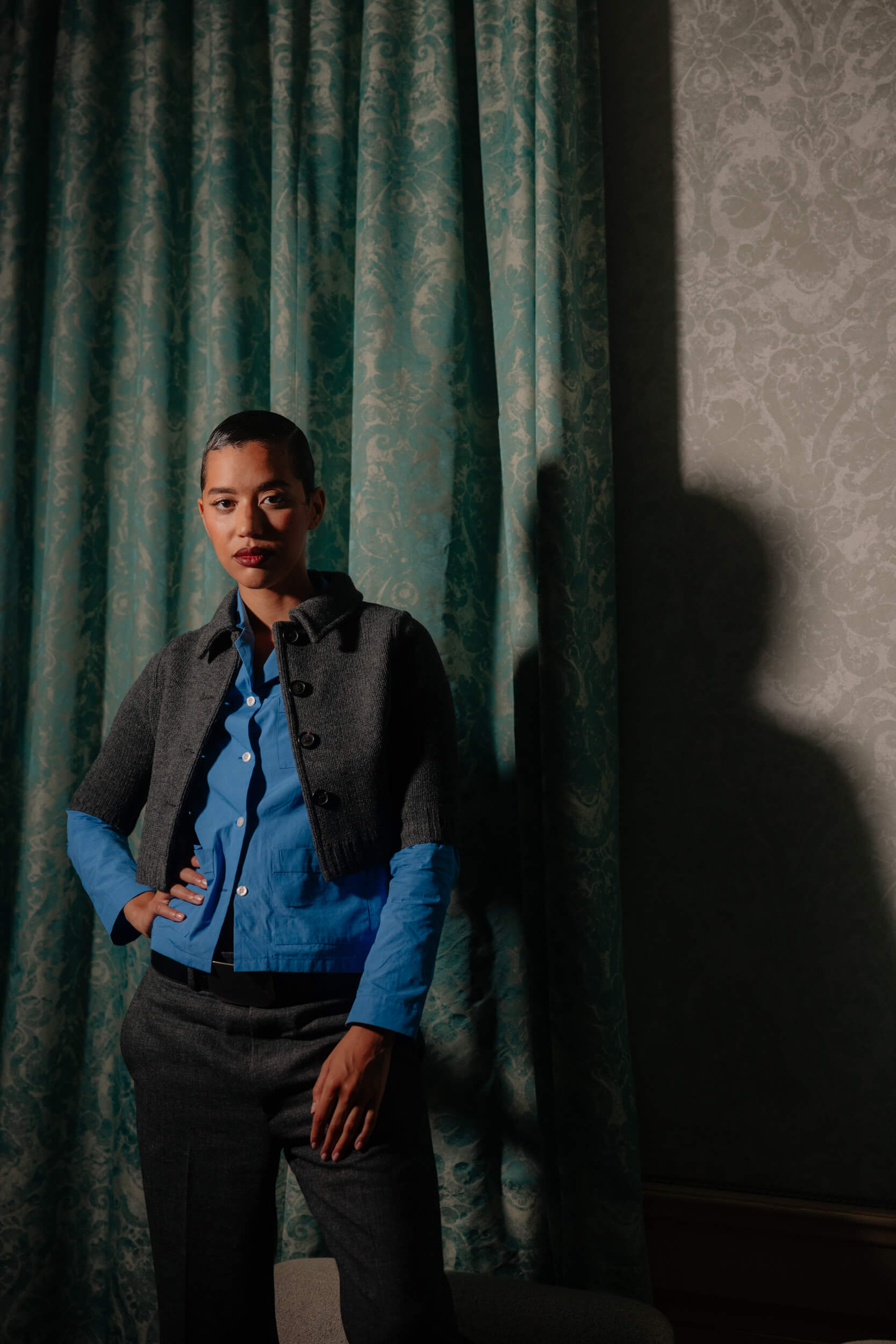
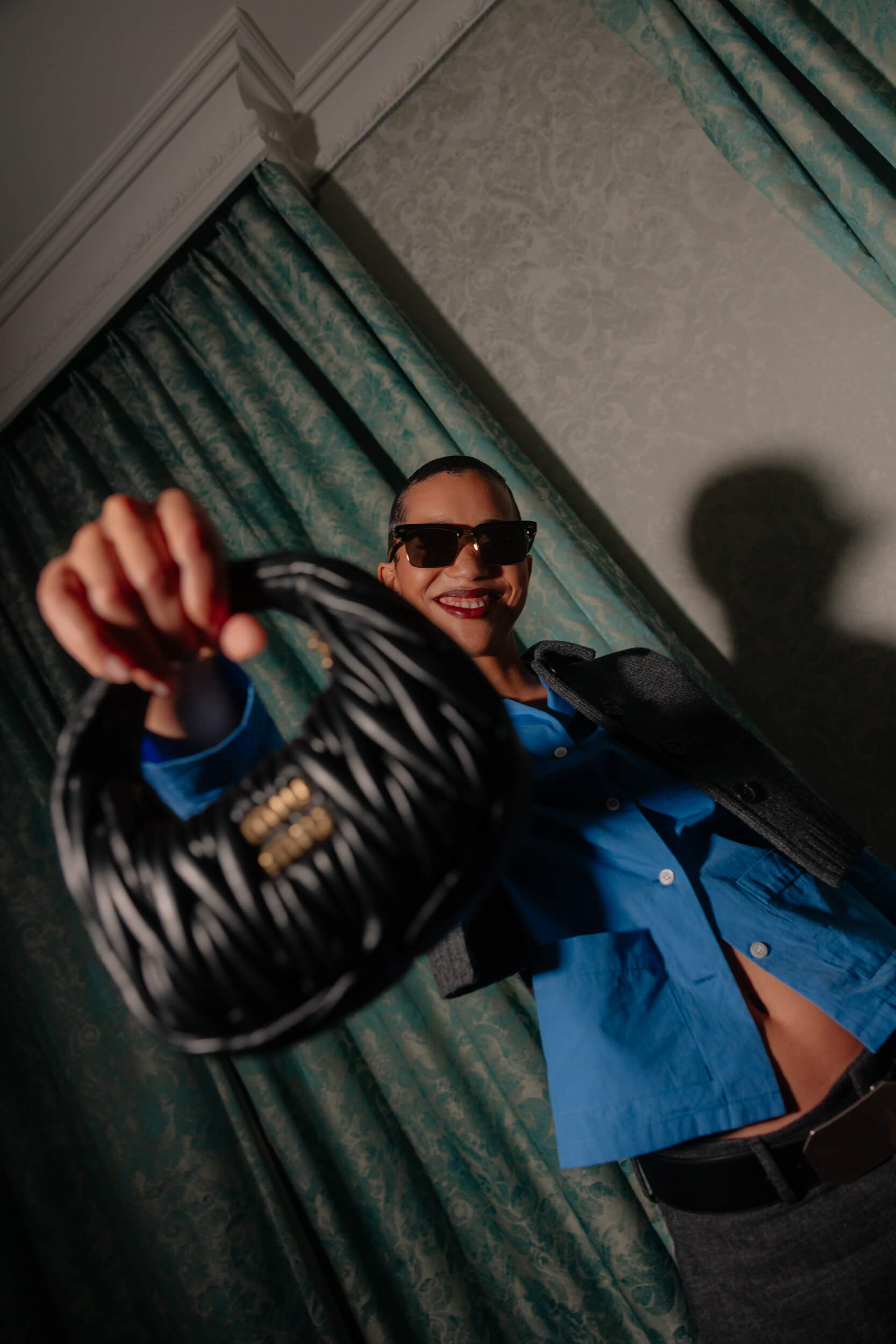
During the Miu Miu Women’s Tales conversation, you said it’s funny and liberating. You said that music has always been your heart, that acting doesn’t scare you as much as music because when you write music it’s just you, as you said. How do you cope with the many different emotions that just being yourself brings with it?
I think that’s why I need to write music, it’s an outlet. It’s an outlet for all of those pieces of myself and, you know, there are so many songwriters that tell stories with their music and I think that’s a great way to go about it, but for me, it’s all just based on personal experiences. In this EP that I’m getting ready to release, every song is a story of a different person that I met and had a fling with or fell in love with, and so I think the coping is the writing of the song, that’s me processing it, and then once it’s out in the world it’ll become something for other people, hopefully.
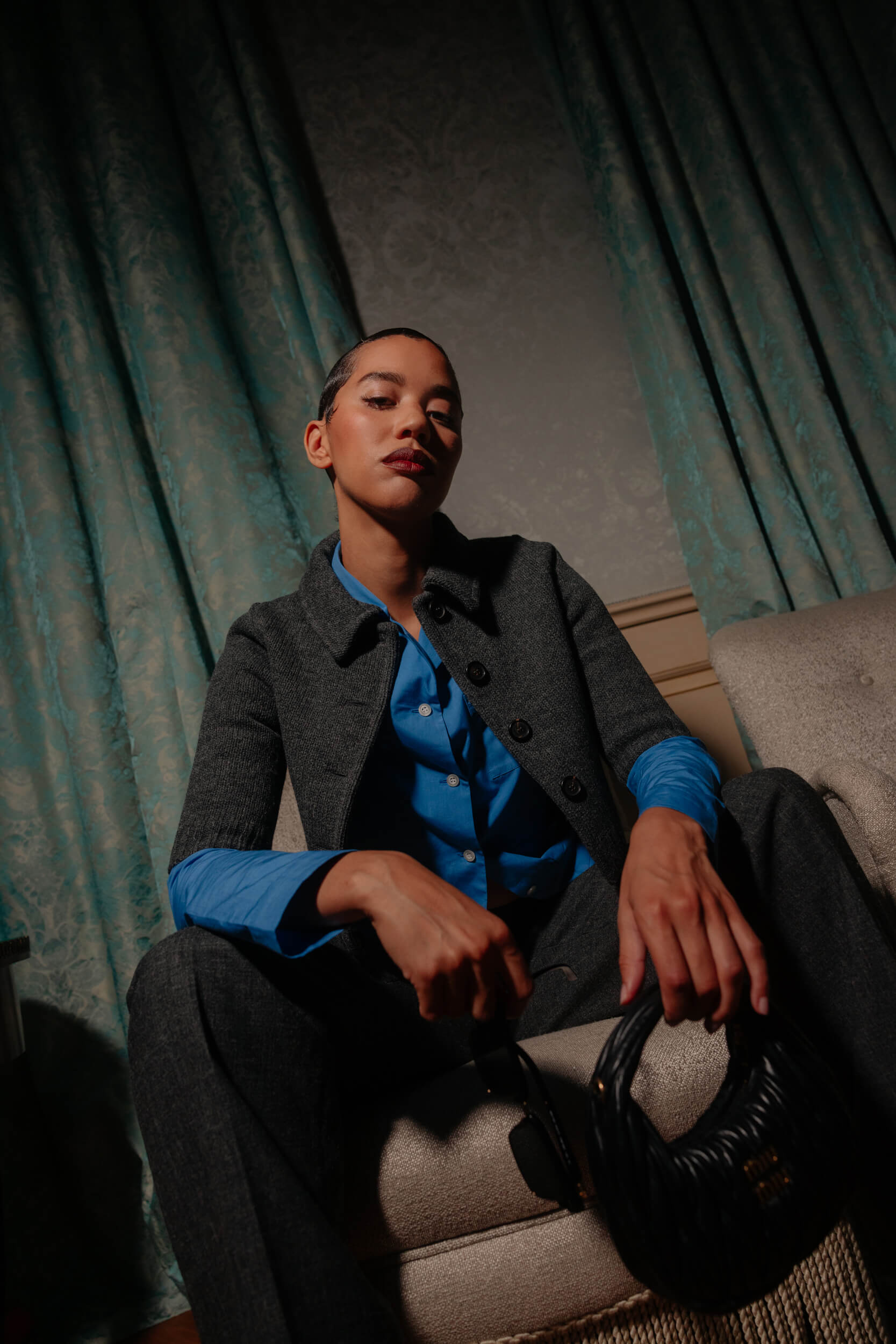
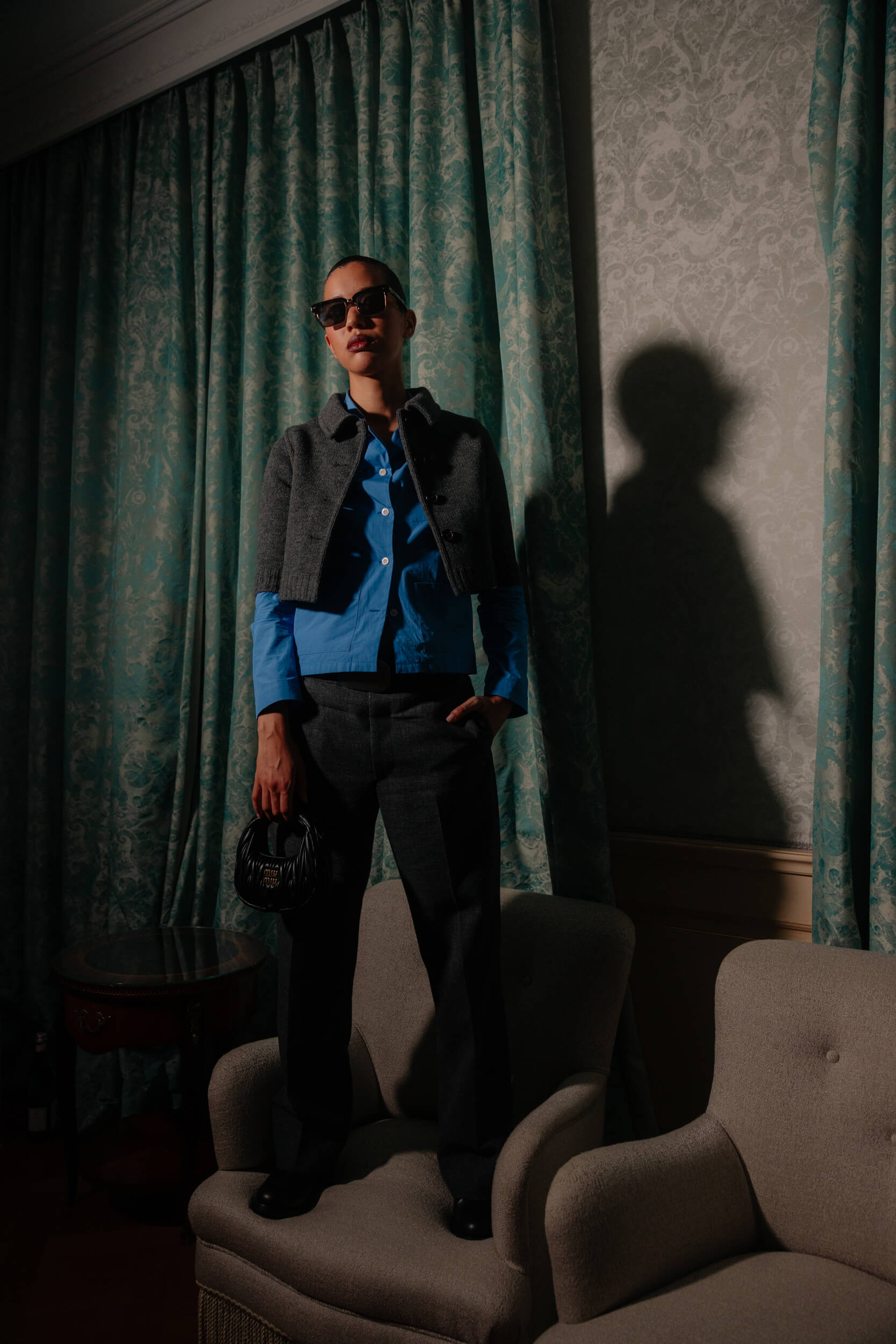
“Music, it’s an outlet for all of those pieces of myself”
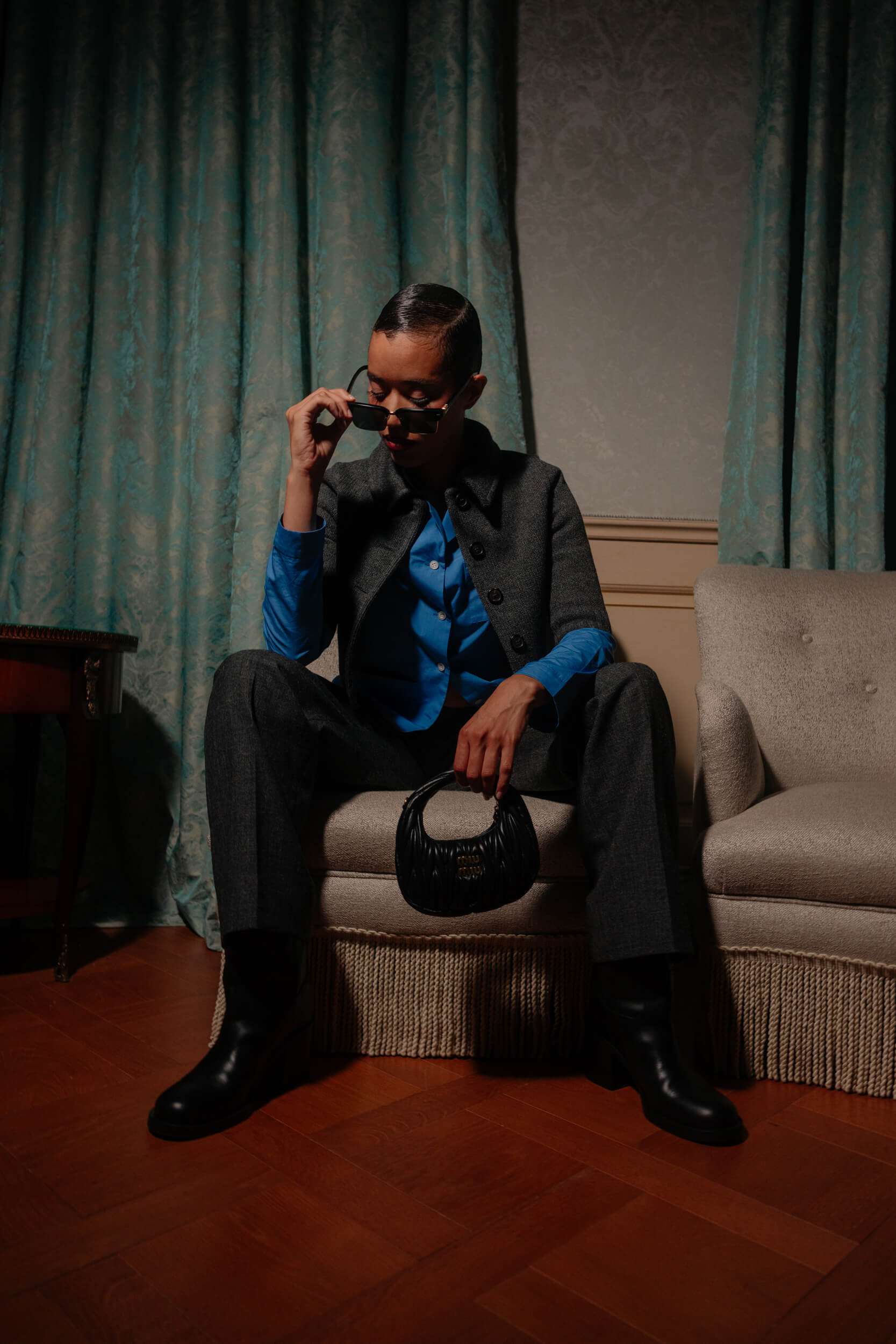
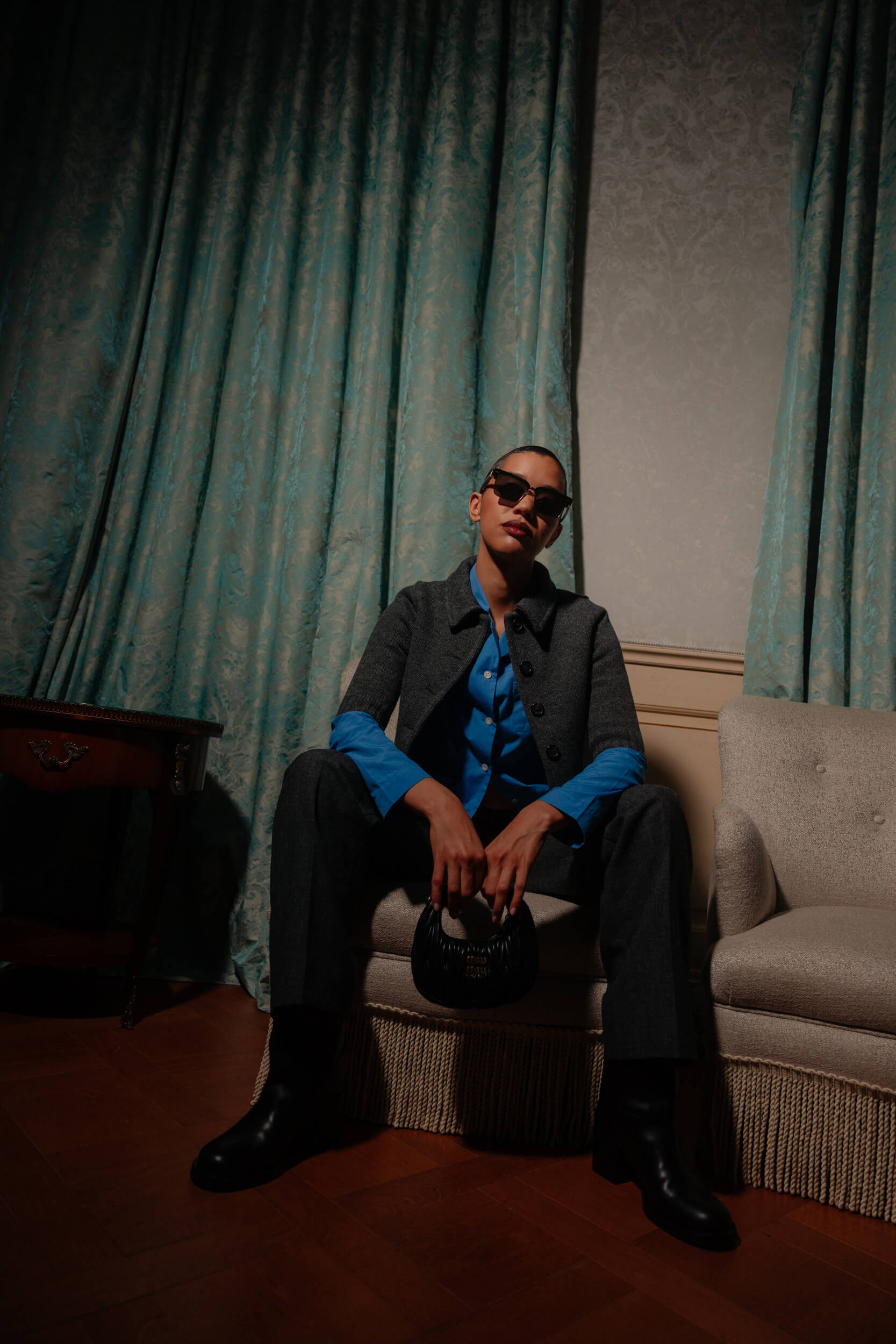
Are you writing something right now?
I’m kind of always writing something.
It depends on the season. There are these seasons where it’s every single day and then I went through a recent season where I didn’t pick up a guitar for like eight months, and so I’ve just now been sitting back down with my guitar and writing music. And it’s interesting to see what’s different now that I’m in a healthy relationship, I’m on antidepressants, and I’m a healthier person.
It’s interesting exploring artistry, like now being healthy with a therapist and medicated and getting enough sleep. I was so afraid I wouldn’t have anything to write about, but I do. I think that’s a myth that artists have to be unwell.
I’m following your same path with mental health… I was so scared because I’m a very empathic, maybe too empathic person. I’m very emotional and when I started this medication, and it was the first time for me, I was like, “Oh, I won’t be so sad anymore”, but at the same time, I felt scared that I would not feel all the emotions.
Yeah, but it’s not like that. Instead of walking around and everything’s gray, everything’s in color. But I still cry, I still get sad, I’m still hurt, I’m still feeling things, which I think is also a testament to my psychiatrist that she put me on the right medication. I didn’t have to try a bunch, I’m really lucky. It’s a myth. At least for me. I’m still feeling, I’m still empathetic, and all of that.
And I’m just not sad every day. Which is really nice.
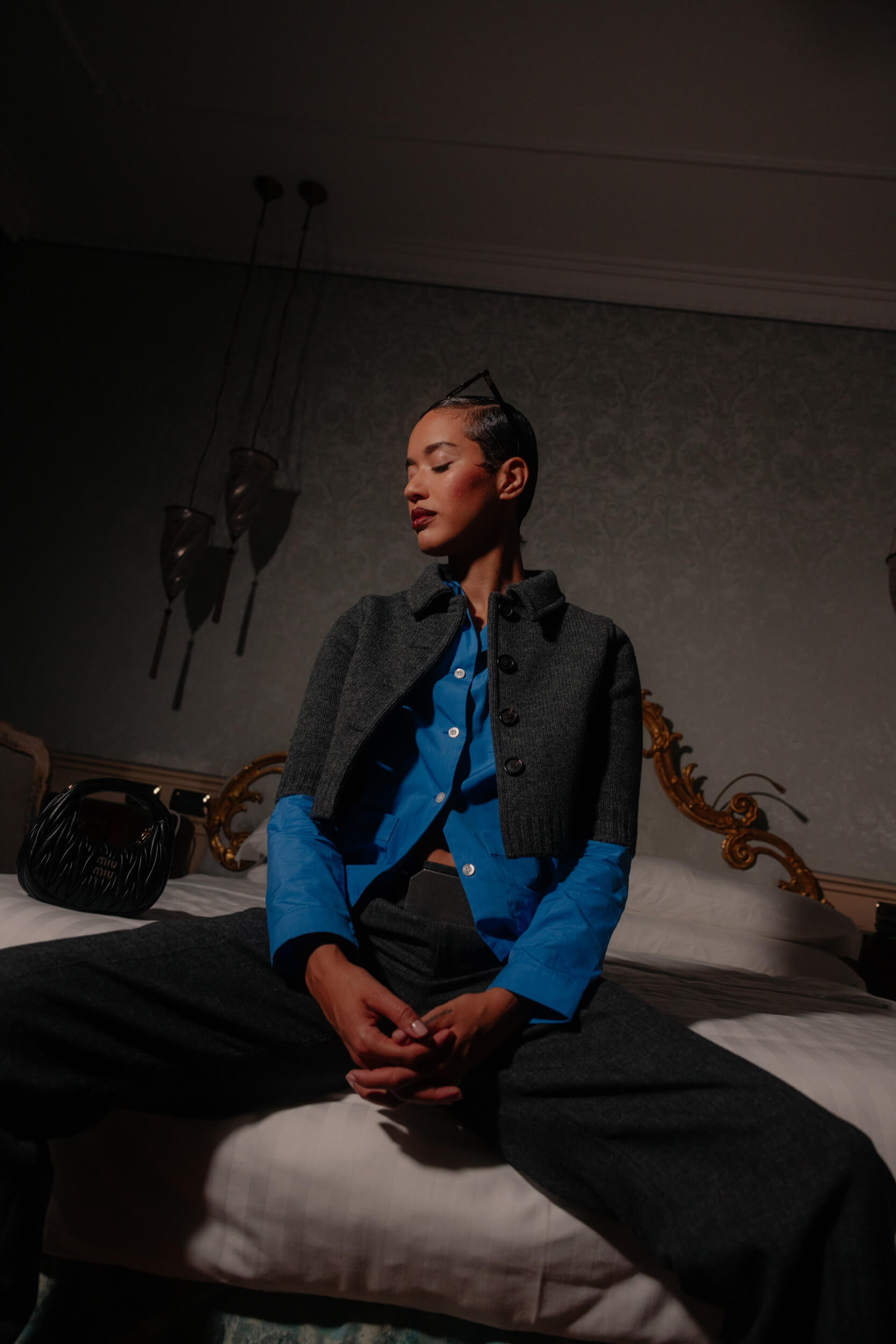
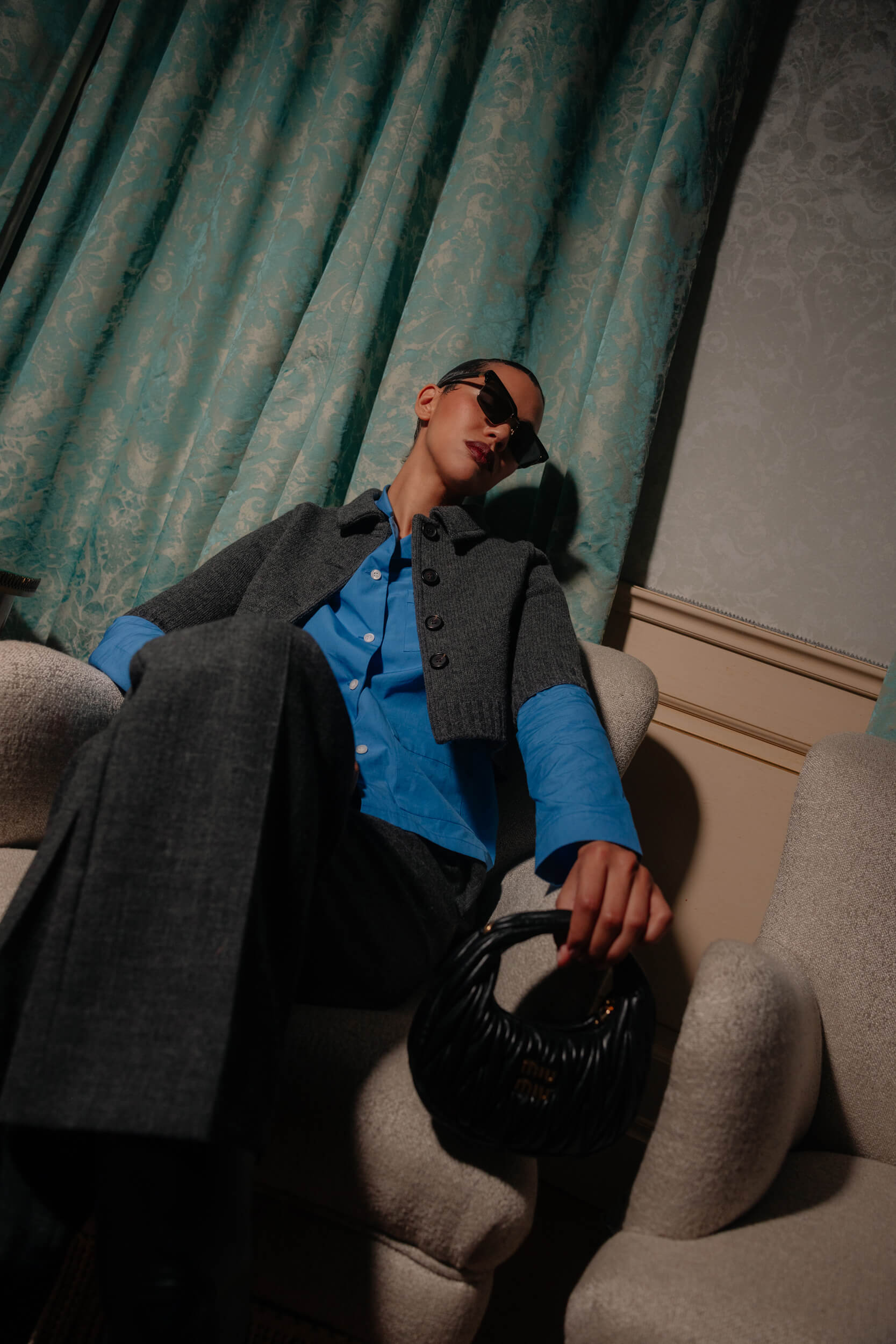
What’s the process when you approach a new work project? How do you let creativity flow? Are you more rational or instinctive?
I’m definitely more instinctive. You know, Molly [Gordon] said something about this during the panel, something about the more successful she has become, that she’s gotten a bit more timid and afraid in her work, and I relate to that. I was speaking with someone after the panel about Taissa, the character I play on “Yellowjackets”, and said that coming into season three, it’s kind of gotten in my head, because it was a bit scary. I’ve been playing this character for five years, I know her so well. On one hand, you would think that would mean I could just totally let go and trust myself and I do, but now this character means so much to so many people. Rationally in my head, I don’t want to do the wrong thing, I don’t want to mess it up. I don’t want to let anyone down.
So, there’s something actually a bit scary about playing a character for so long. But when I first began something, when I approached something, I’d say it’s like 65% instinct and like 35% rational.
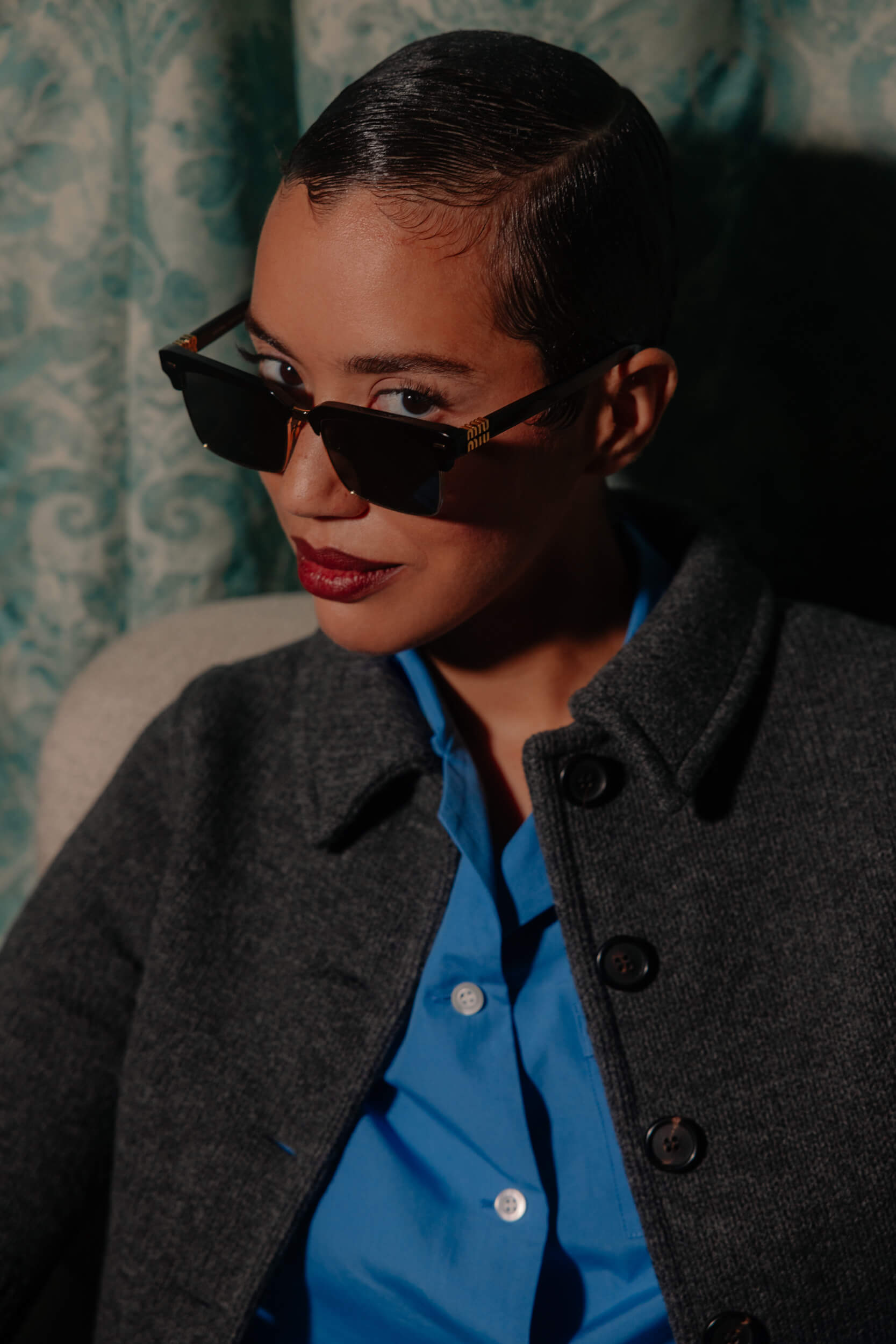
And today you also said something really beautiful and powerful. You said it’s funny and liberating to be unhinged in a way that only women can. What does this concept represent for you and how do you try to stay true to that aspiration every day?
Thank you. You know what, to me what that means is existing truthfully outside of the lens of the male gaze. That’s what I mean by “unhinged” in a way that only women can be.
When you see them, when you see women being portrayed as crazy or whatever, it’s often through a male gaze and it looks a very specific way. And when we take them out of the picture, “unhinged” doesn’t even necessarily have to be a negative thing: some of my favorite moments with my friends or lovers, or when they are “unhinged” in their way that can be like a manic episode of painting and cleaning, like, “You’re so unhinged right now, why did you just clean the whole house and paint for three hours?”, that’s such a specific female thing to do. And so is like killing someone who broke your best friend’s heart. Both of those, I would call “unhinged”, but different offshoots of that. And you know what I think? I get to be unhinged in my life day to day more than a lot of women that I know because I am in a lesbian relationship and in lesbian circles. So, I stopped living my life for the male gaze years ago, and that allows me more freedom to be unhinged, AKA my full self.
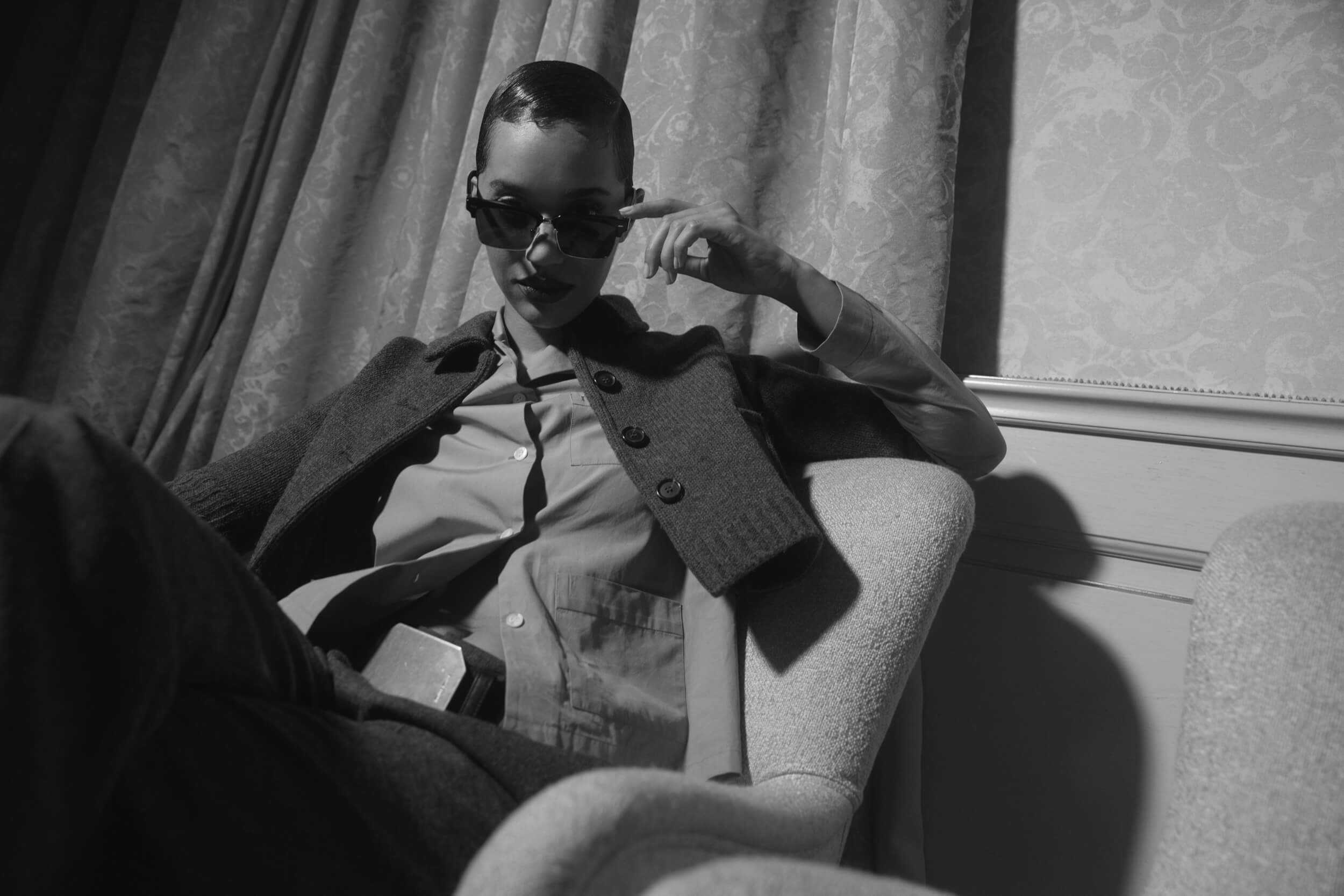
“I stopped living my life for the male gaze years ago, and that allows me more freedom to be unhinged, AKA my full self.”
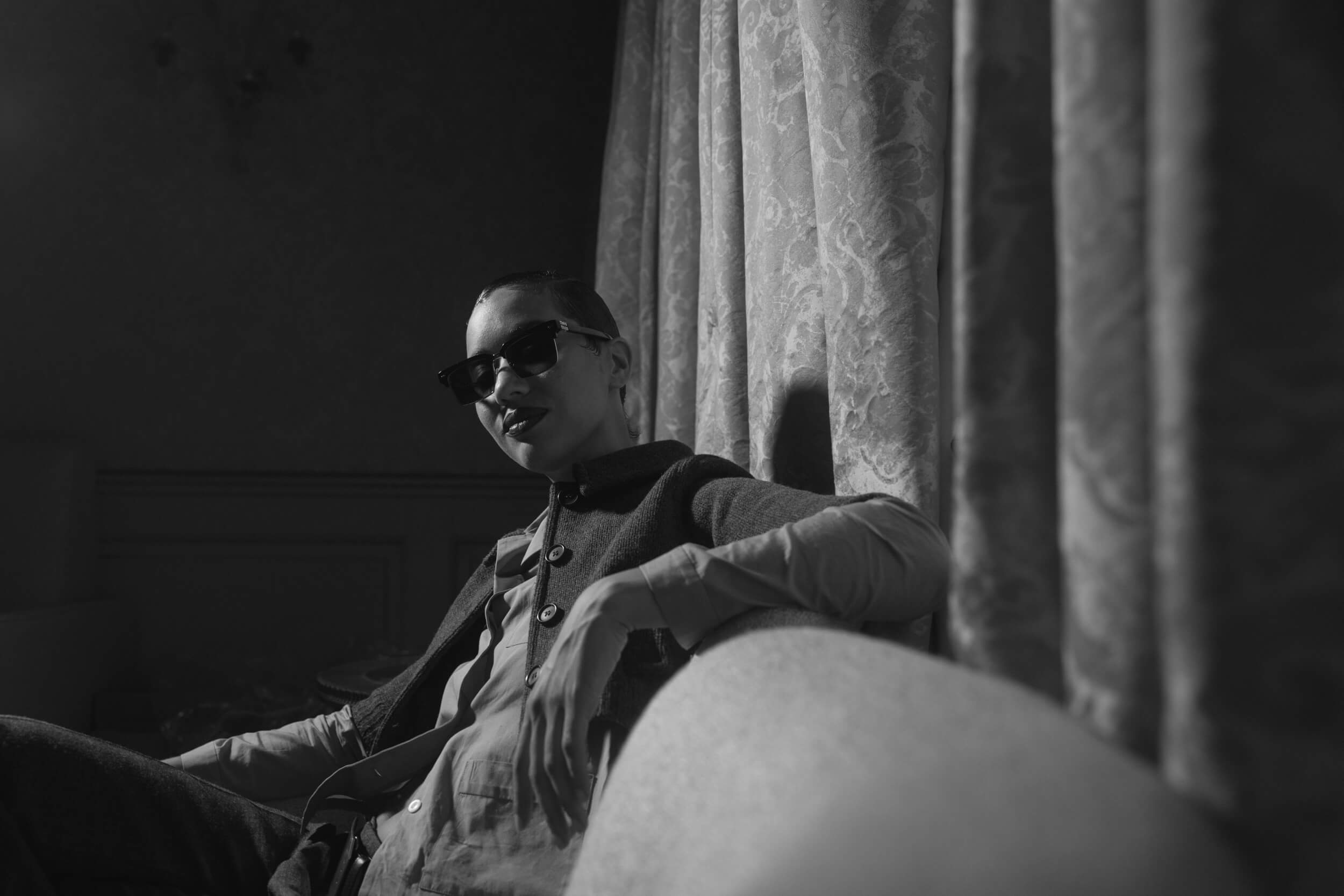
And what scares you the most?
In general? Spiders! I hate spiders! I actually wonder sometimes if I was bitten by a spider and killed in a past life because I am so afraid of spiders. This summer, three separate times, I looked down and a spider had fallen on me. And I was like, “Okay, maybe it’s the universe giving me an opportunity to like them”. So, I started going, “Okay, maybe they’re cute”, but no, no way. But apparently, very few spiders can actually hurt you. I think I need to do something.
You shouldn’t go to Australia, though.
No. I did go to Australia, but in the winter, thank God, and the spiders weren’t out. Because I’ve heard that they’re huge. I would pass out. I would actually pass out.
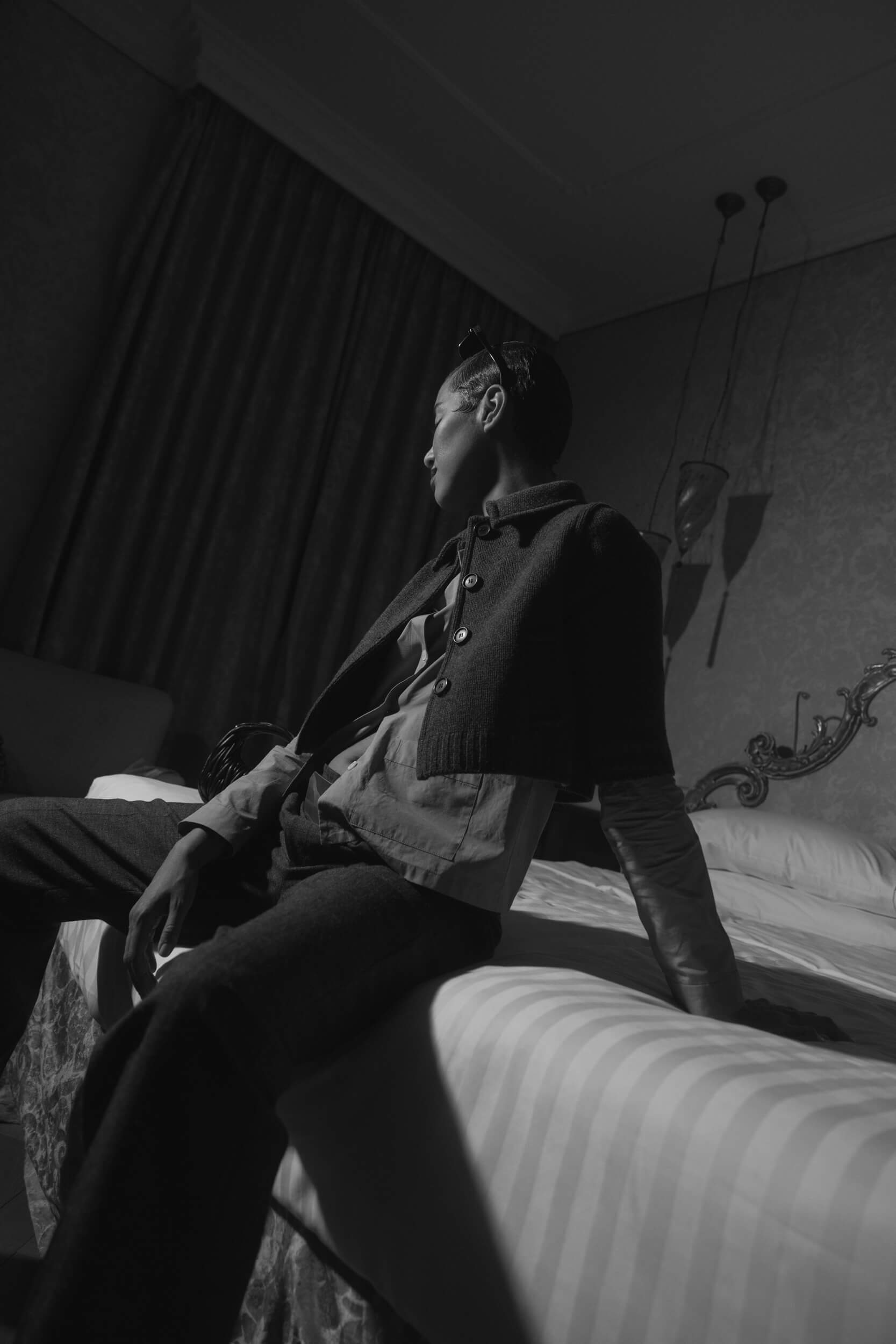
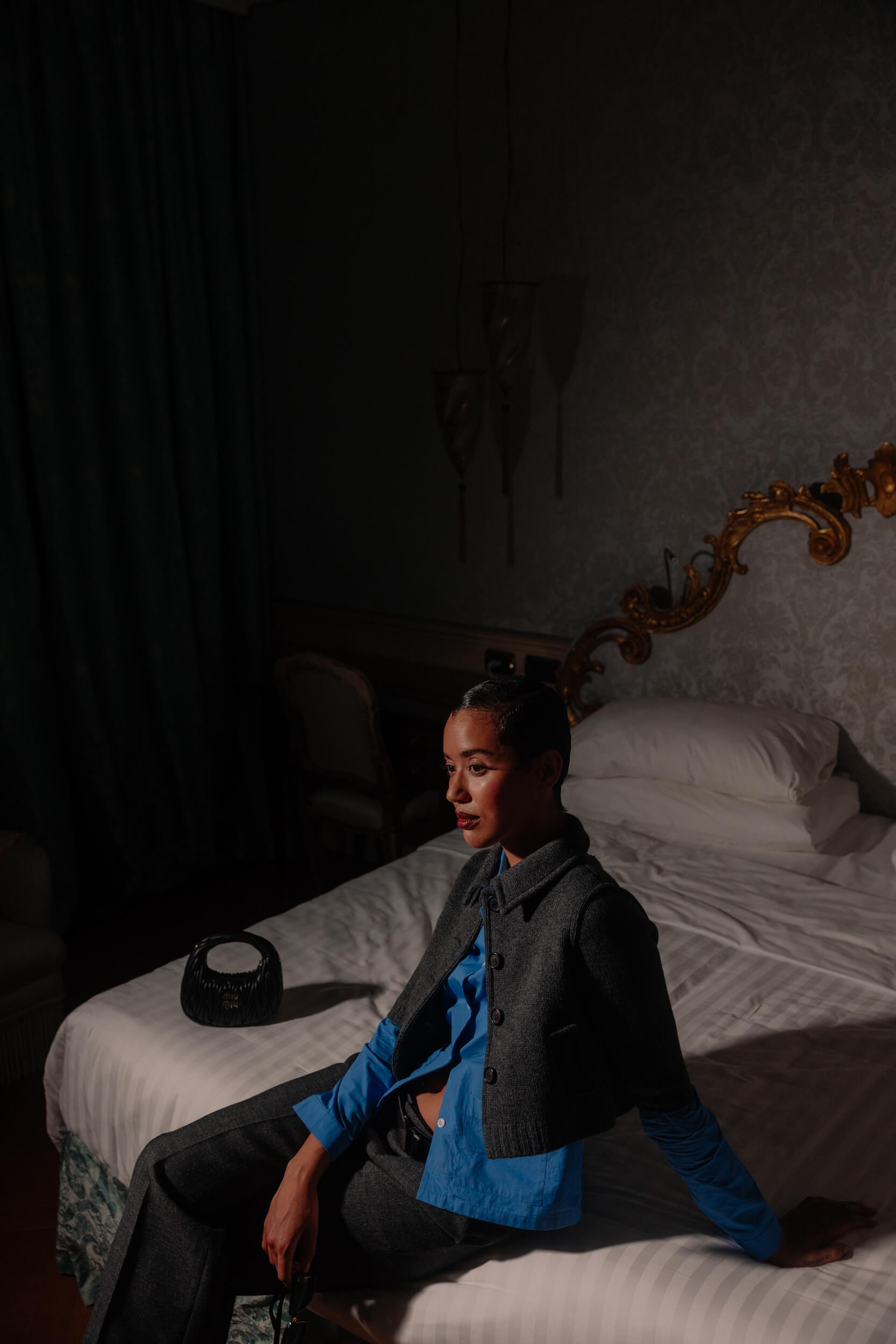
And when do you feel the most safe and self-confident?
I feel the safest and most self-confident when I’m with my partner, who loves me so much. For me, she doesn’t love me for an idea of me and it’s really cool to get to that point in my life where I’m actually in a relationship because we both just like each other. You know, I’m in my mid-twenties, and my past relationships were so exhausting, but I’m past that now, which is nice.
And also, when I’m with my best friends. You know what it is? It’s when I’m with women who I figuratively and quite literally don’t have to wear makeup around. Like my absolute best friends, when we just want to go hiking and camping and just be women, feral and funny and exist.
And I feel that way with a couple of my best friends and with my partner.
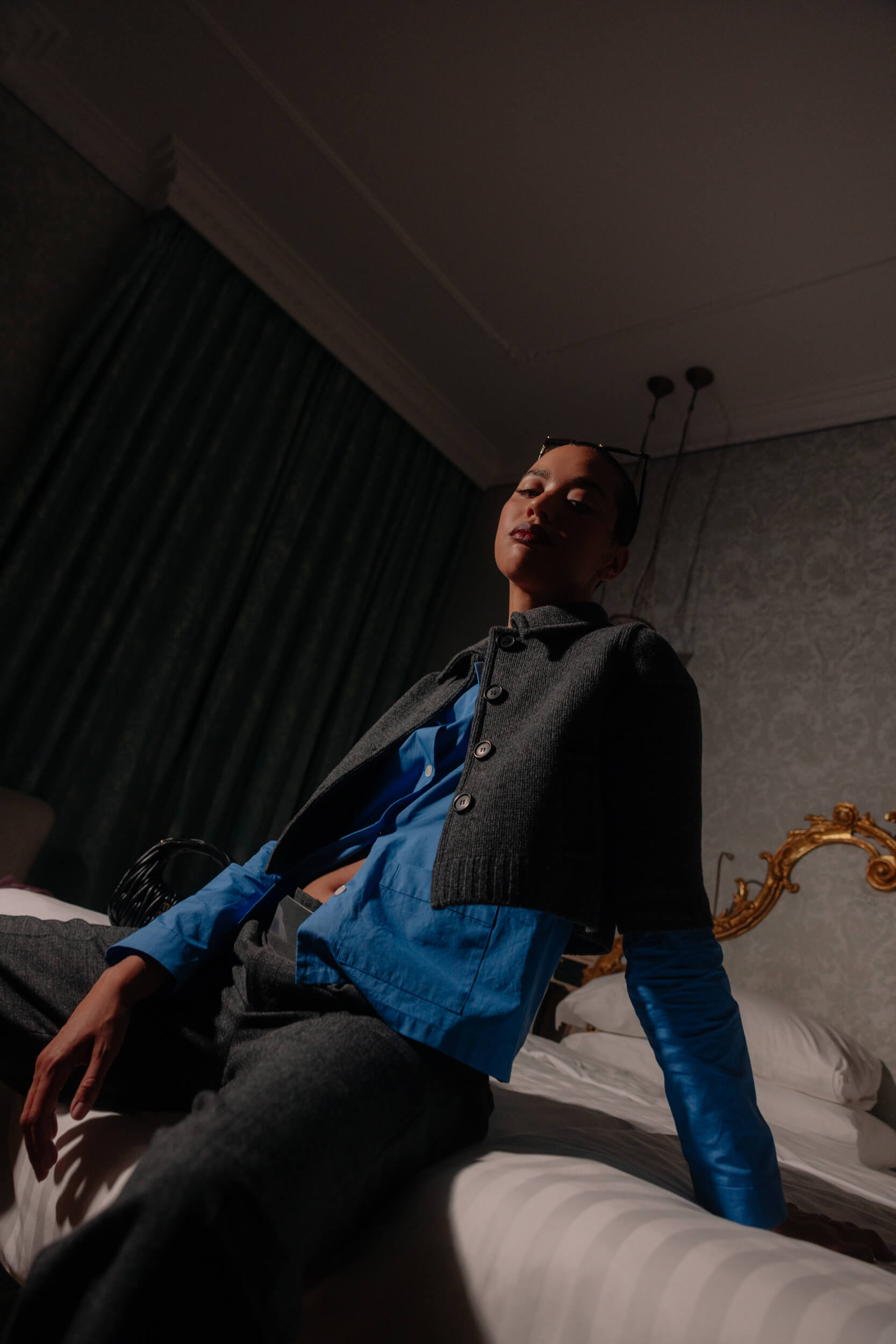
That’s great.
And you are directing your own music videos, and you want to focus more on being a producer. How has the journey been so far and what are the main challenges you had to overcome and the best part of it?
Yeah, I’m getting ready to direct one of my music videos. The first two, I produced, but I found directors and they were amazing and I think, honestly, the hardest part is overcoming the voice in my head that’s like, “You’re not ready, you can’t do it, you’re not good enough, you don’t know enough people”. And so finally I just started DMing people and being like, “Hey, are you down? Do you want to make this video? Do you want to work with me?”.
And people are down.
When you’re passionate about something, people will show up and get excited too. That’s been really fun, also just seeing people respond to the music. I wrote these songs in 2020 and kept them to myself, recorded them a year ago, didn’t show anyone and now sharing them with dancers and other artists and seeing them respond is like the most beautiful, humbling and overwhelming experience.
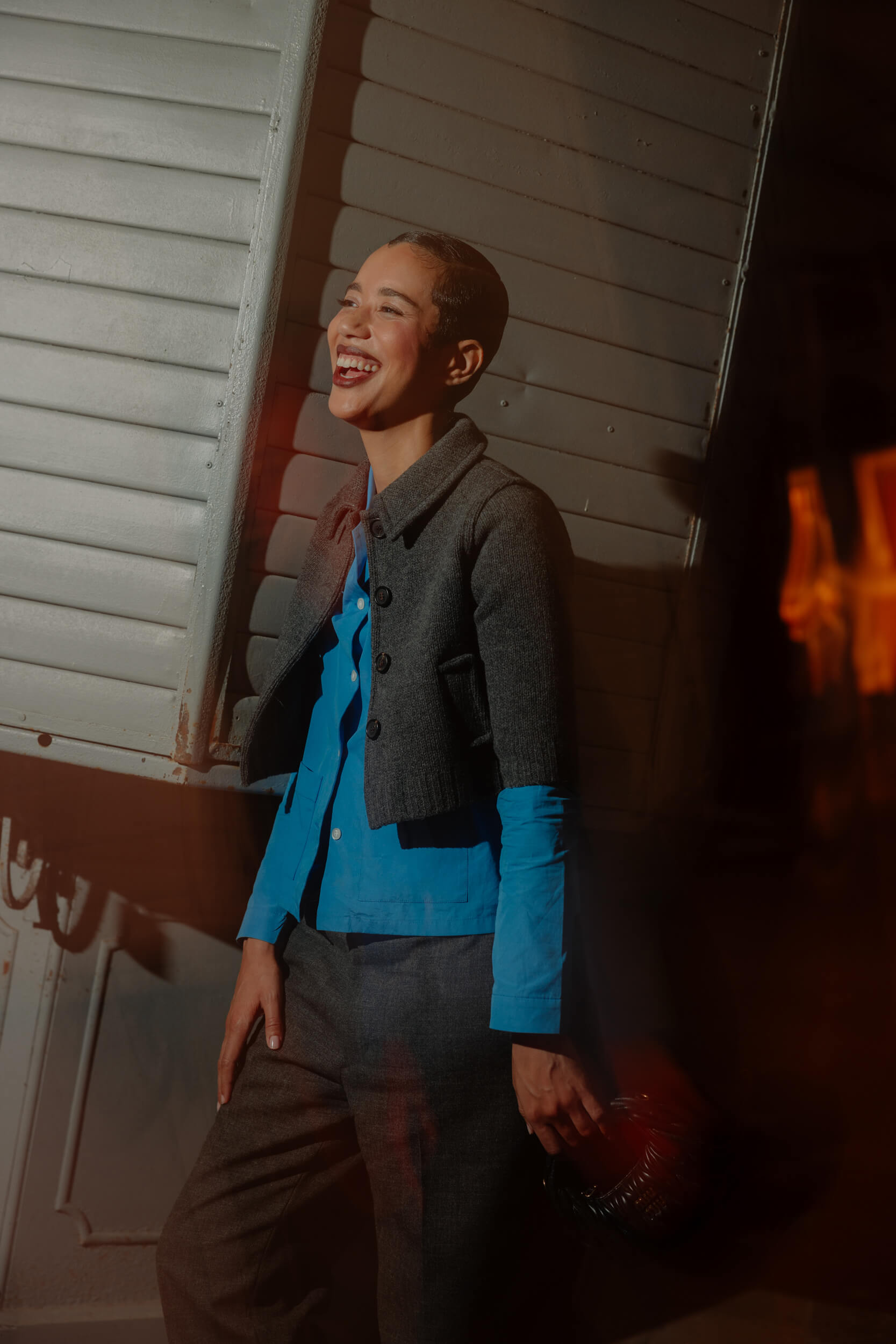
“I think, honestly, the hardest part is overcoming the voice in my head…”
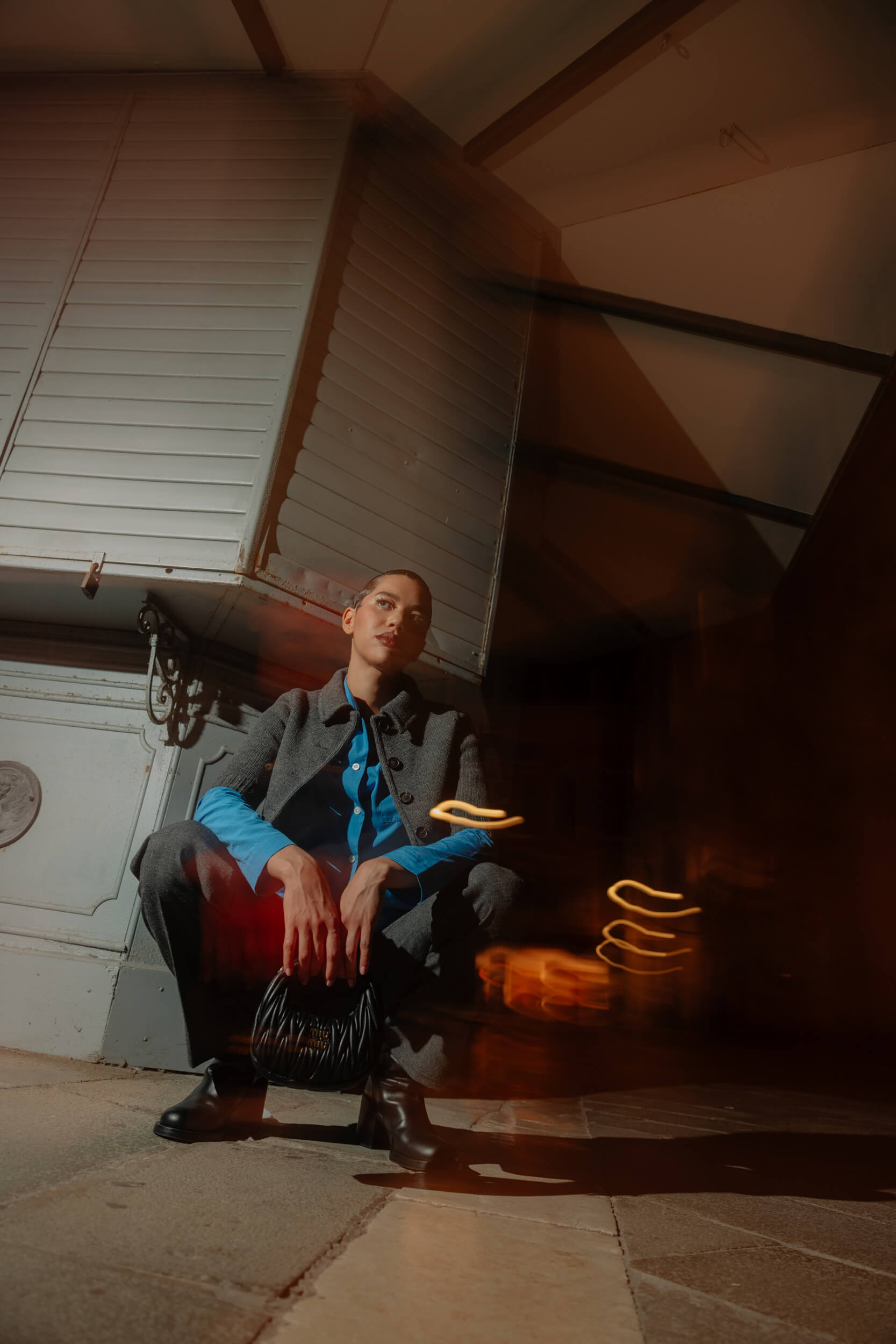
And you spoke also about the importance of being surrounded by strong women, both in your everyday life, like you said, and in the workplace. Who are the women that inspire you the most? And what legacy would you like to share with other women?
I love that. The women that inspire me the most? Well, you know, in my personal life, there are so many, but Monica, who is my manager, comes to mind because she’s a woman of color and she reps majority of women of color. And you know, just like being frank, like in every other area of life. Women of color are just so underpaid, underrepresented, underappreciated, undervalued, and she makes sure that we all feel celebrated and strong and empowered and she inspires me so much.
You know what, I’ve gotten really close with my niece, Alex ,in the last two years. She just turned 18 and her generation, they’re going to be fine. I’m not worried about them. But I think what I would want her to know is just:
“You’re always right. Tune in. Tune in before you tune out”.
I think especially as young women, I don’t know about it culturally in Italy, but in the States, we’re very much conditioned to: “What does everyone else think? What do you think I should wear? What do you think I should do? What do you think I want to eat? What do you think I want to watch? What do you think? What do you think? Should I like this person? Should I not? What do you think?”. And I want Alex and her friends to ask themselves first. That’s what I’m hoping Gen Z and Gen A do. It’s like, “Do I like this person? Do I like this school? Do I like this music?” before getting everyone else’s opinion because you know, you always know.
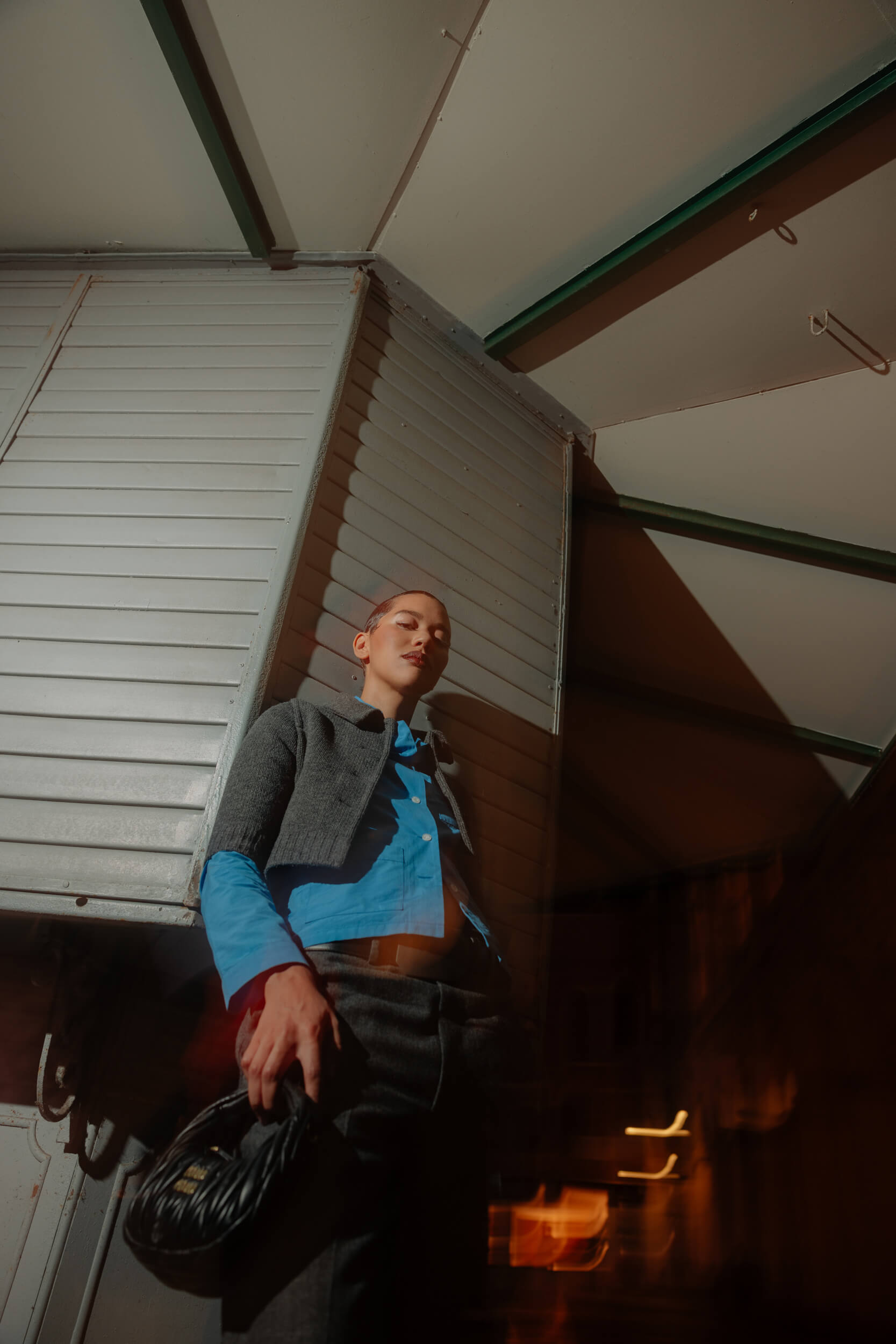
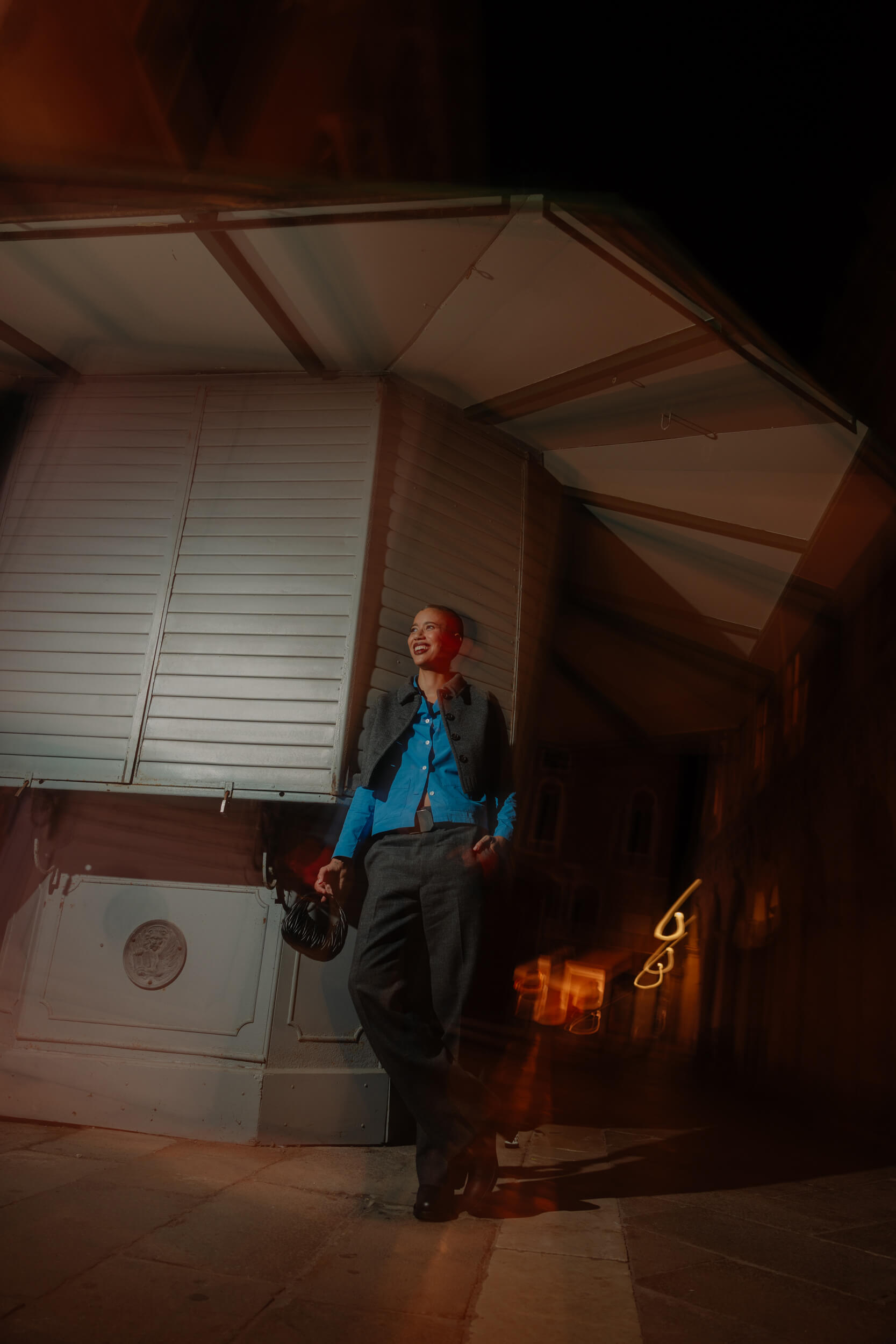
I think growing up, for me, this was the hardest part because you always stay with a certain group of people, and there are your parents with their own opinions and then your best friend with their own, and I said, “What do I like? What about me? What person am I? I was younger, of course, but that’s why I always say that in my 30s, I’m feeling better. Even if I’m going through things, like I told you, I’m feeling better because I’m feeling like I’m getting to know the real me.
It’s so hard. I don’t think men have that. At least not nearly in the same way. They’re not raised to ask everyone else’s opinion.
My partner told me the other day that the average age that women realize they’re queer is 28, but the average age that boys realize they’re queer is 18. And that’s a difference because we women, also talking about sex, in the media, in culture, the conversation around sex with men is like, “Yeah, it was fine”, so that’s what we’re taught to expect, but you’re not going to realize until you’re almost 30 that it shouldn’t just be fine, it should be great. Whereas teenage boys maybe sleep with a woman once and say, “I didn’t like that…Ok, I’m gay”! It’s that simple, they don’t have to spend 10 years asking everyone around them, wondering, figuring it out. It’s the perfect example of the different realities we live in, men and women. It’s wild.
“To have the power to make things run better is always fun”, is another powerful concept that you shared today at the Miu Miu Women’s Tales. What do you think everyone could do, with their own power, to make things change for real? Also talking from your experience.
I think that what the film says, but also just in general, it’s quite simply just speaking up, but I shouldn’t say “quite simply” because it’s really hard to speak up, actually.
First of all, if you’re in a position of power, if you’re in a position to hire people, it’s about hiring a diverse group of people, people with different opinions, different ways of thinking, and different ways of approaching problems and solutions, and really working on your ego so that the people who work under you or work for you or with you can come to you and say, “Hey, I noticed you spoke to so and so like this and it’s not okay”, or, “Hey, I noticed that we don’t have any people of color in the writer’s room to give feedback”, and as a leader, you go, “Oh my God, thank you”, or maybe even go, “Oh, I feel my ego flaring up, I’m going to call my therapist about that, it has nothing to do with you, thank you for bringing that to me”. For everyone, that’s not at the top, that’s about figuring out how to kindly and respectfully be honest, and say, “I don’t feel so good about this”, “This is my boundary”, or “Have you considered bringing in such and such?”.
It’s hard and it’s scary to use your voice, but I think the more we will do it, the easier it will get collectively.
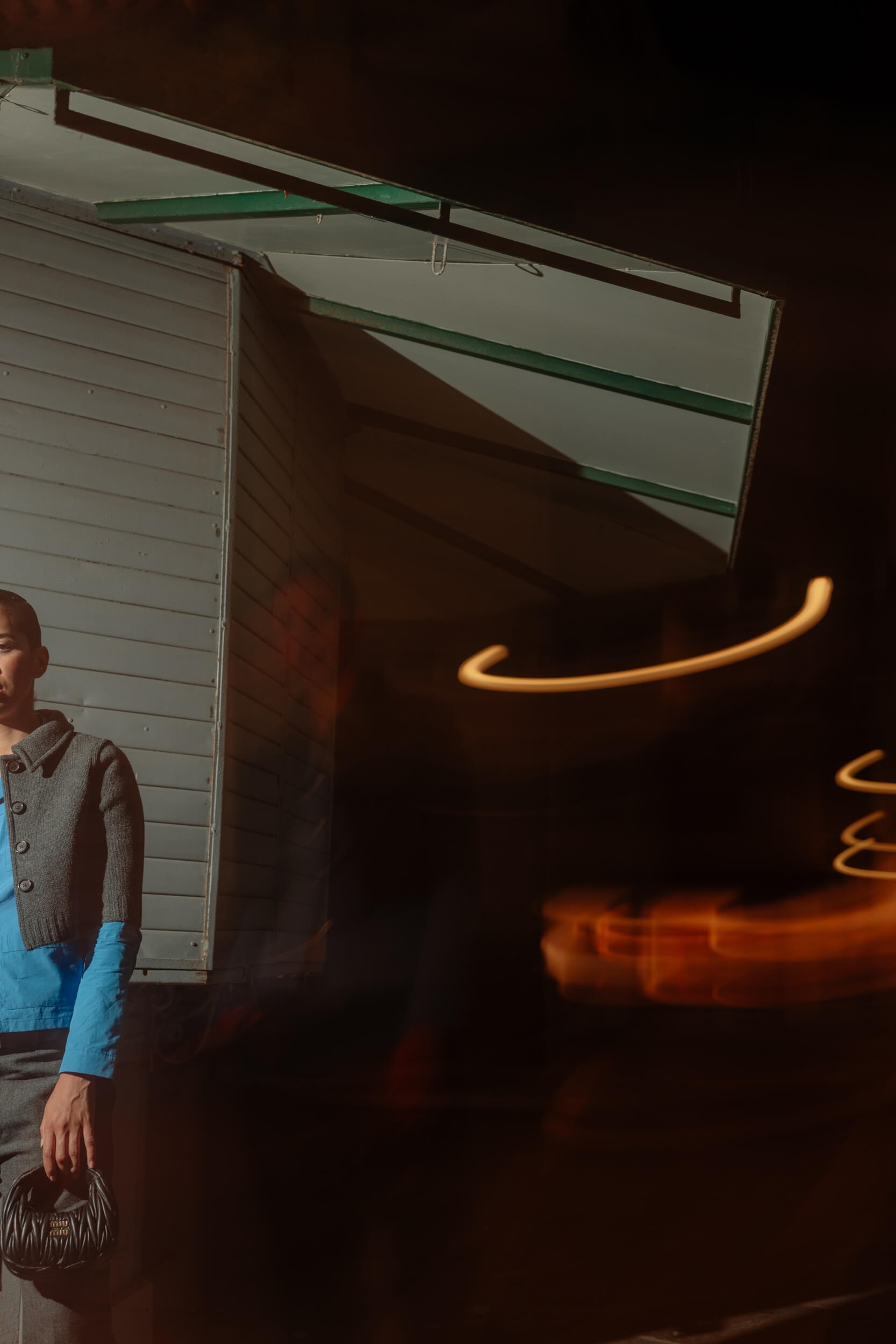
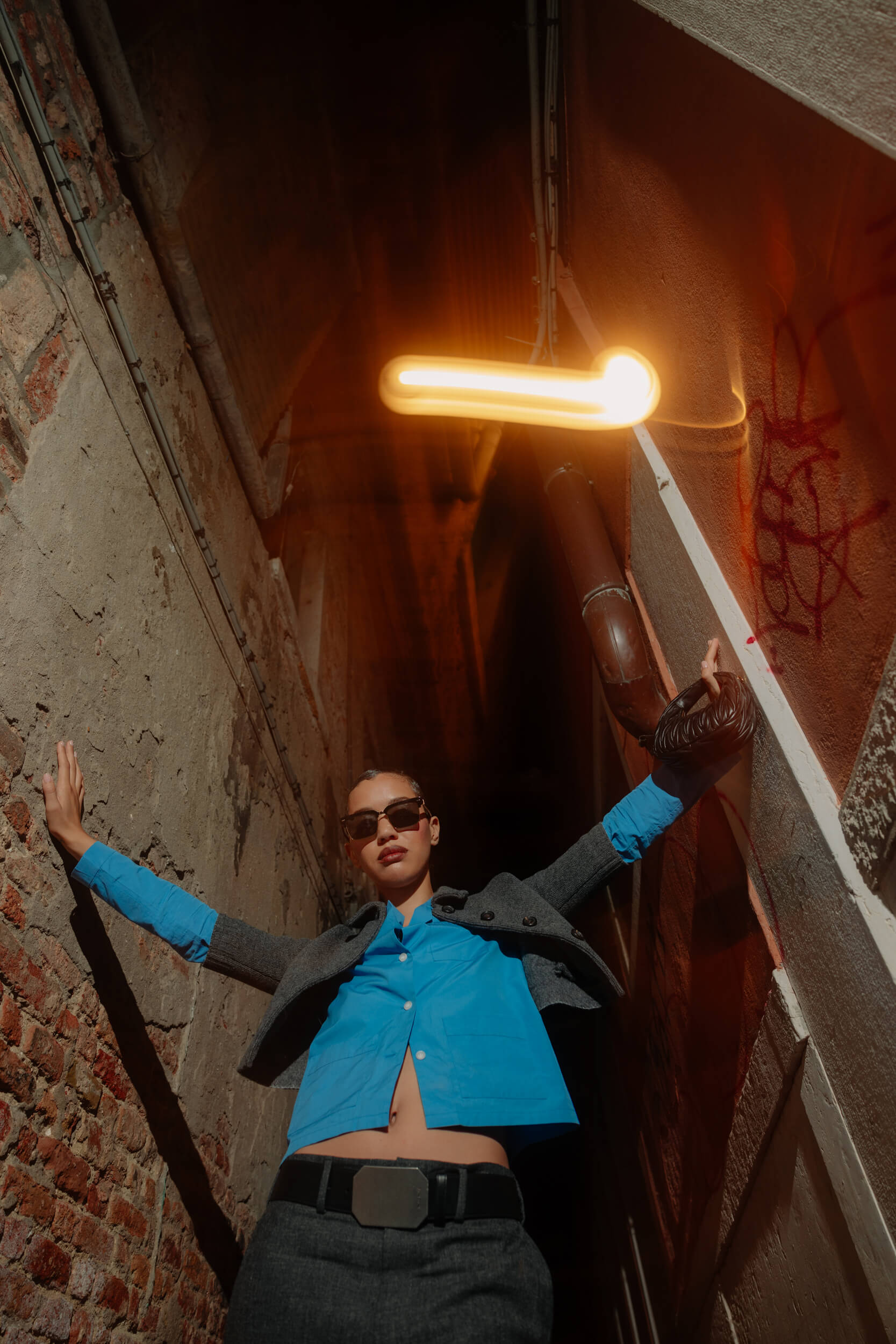
Out of curiosity, you mentioned the fact that you paint, to let your inner child free and because of the feeling that it gives you, with no need to impress anyone. What do you paint?
I’ve mostly been painting people. The first class I took was an oil painting still life class, so it was apples and cups. Then I moved into a course inspired by Jenny Saville, and it’s these beautiful portraits of people you destroy with color, and then I did a life modeling class and I’ve come to find that I really enjoy painting women, women’s bodies and faces: I just think women are beautiful.
The world of cinema and art in general are linked under several aspects to the world of mental health. Is there anything you keep witnessing that bothers you or that you would like to change?
Yes, it’s a good timing that you bring that up because I’ve recently gotten connected with The Loveland Foundation, and they’re a non-profit based in New York City that aims to provide free therapy for black women and girls. I think that’s the perfect example.
I would love to see therapy become more accessible.
It’s getting more common, it’s not so stigmatized now, but it’s not the most accessible. Therapy is expensive, I think it should be like 20 dollars, so I would like to see therapy become more accessible, especially for the black community. I think the Loveland Foundation is doing incredible work getting black women and girls free therapy.
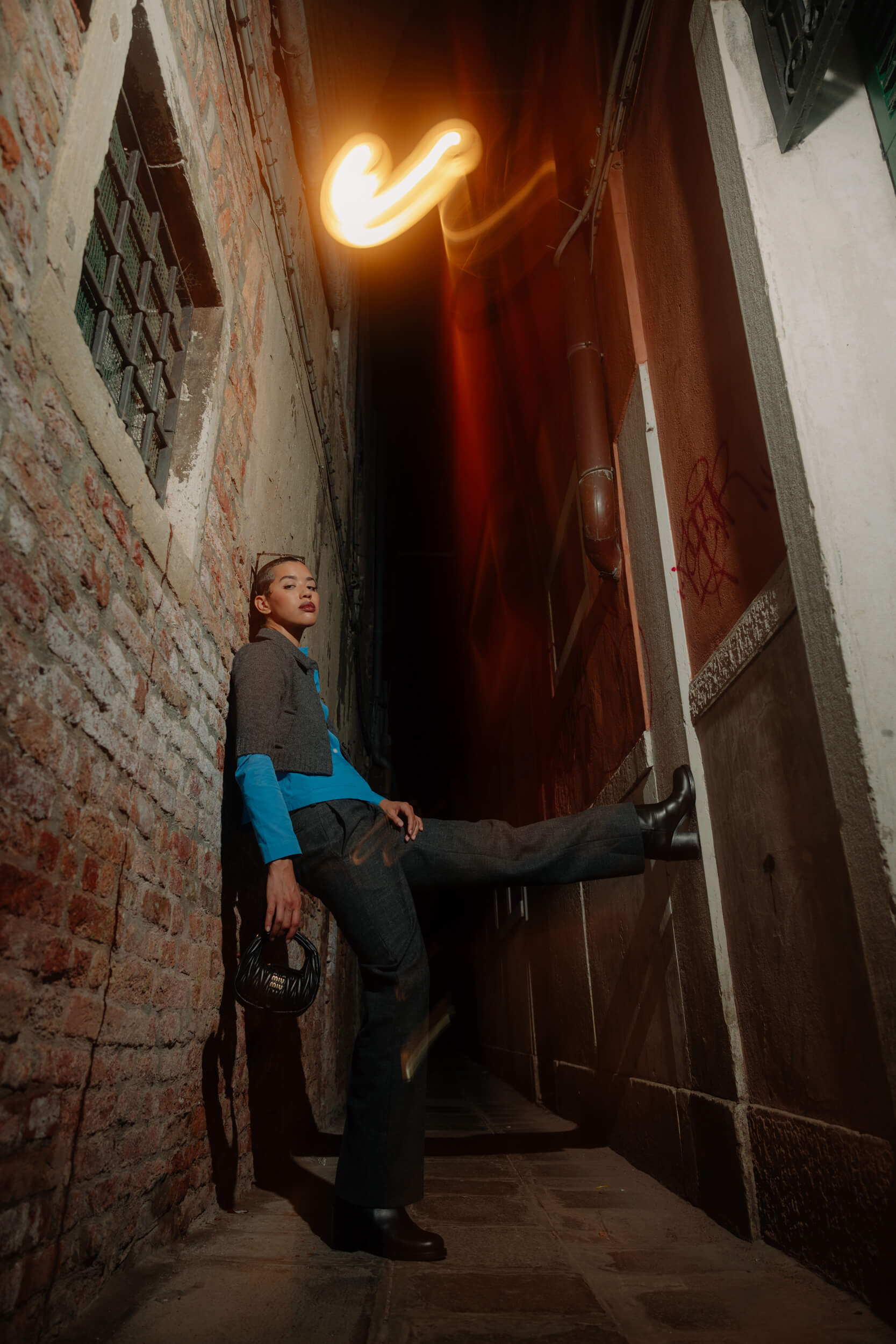
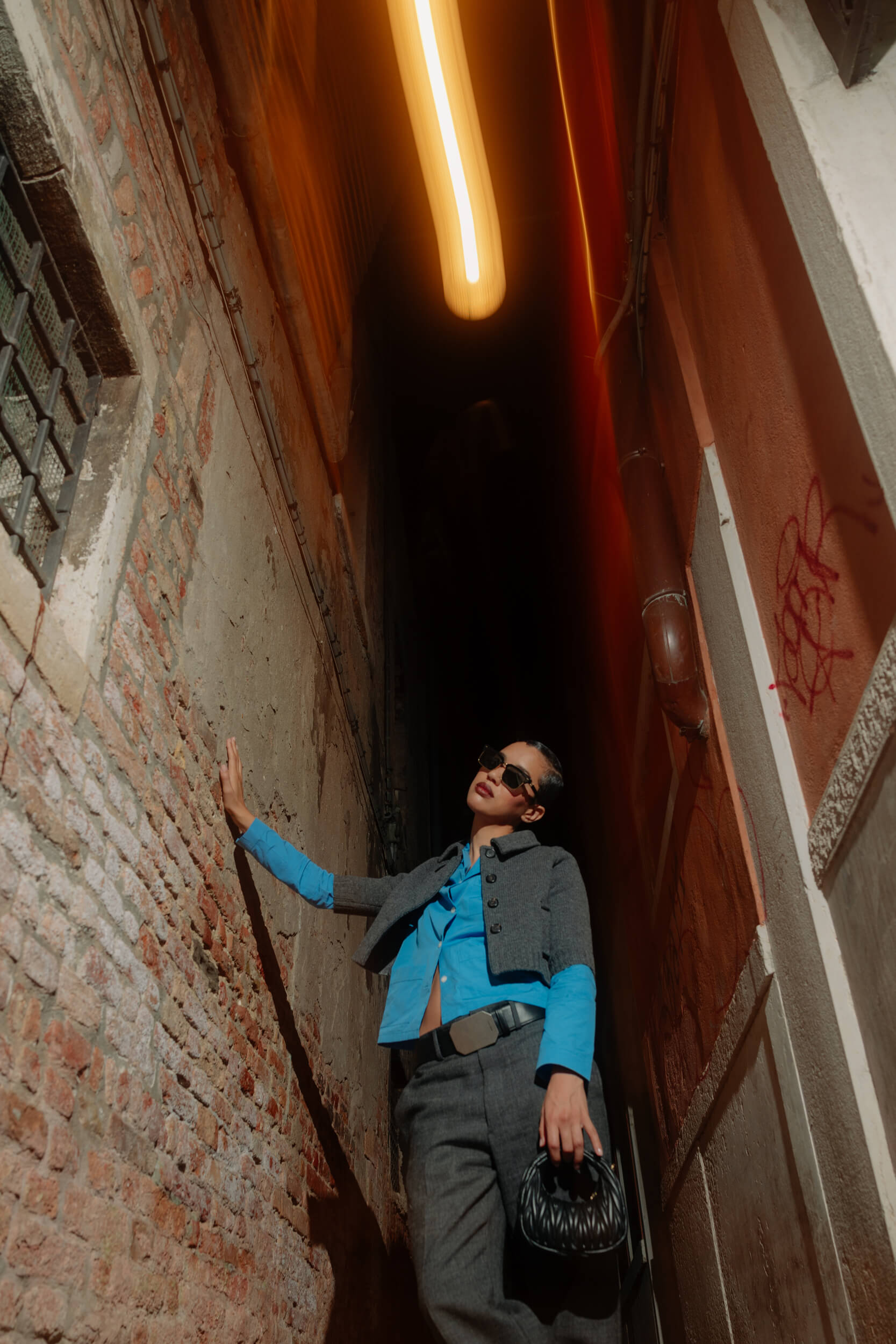
Playing different characters from time to time, you end up spending a lot of time with yourself, exploring your many sides, testing and getting to know yourself more and more. What’s the latest thing you’ve learned about yourself through your job?
That’s a really good question. I know that I’m not a cannibal, I did discover that I’m not really interested in that [laughs]. Recently I learned that I don’t need to take everything so seriously, that I can loosen up a little bit. Life can be more fun and light, it doesn’t have to be dark all the time.
What’s your happy place?
My Cancer moon is showing… My happy place is with my girlfriend.
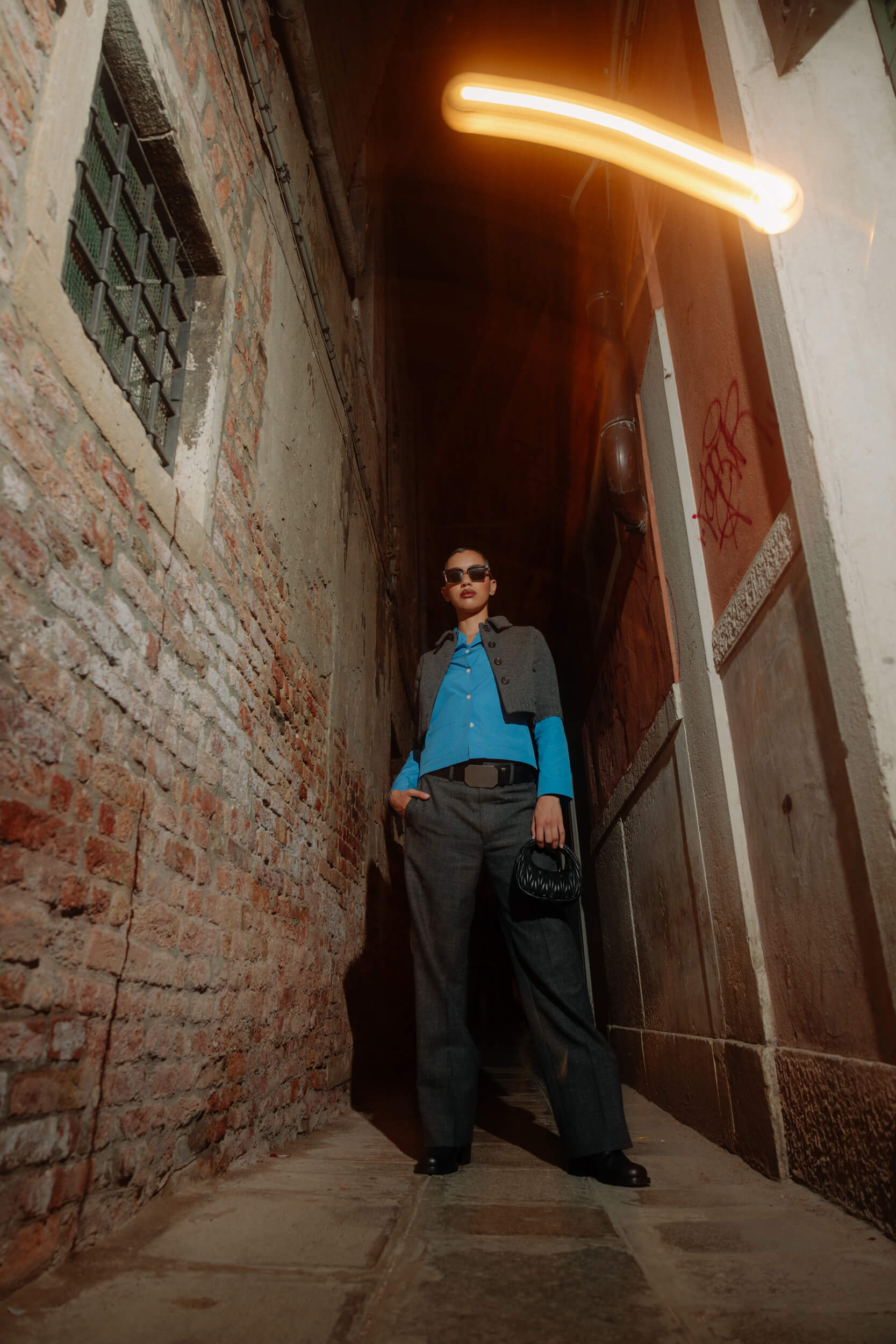
Photos by Johnny Carrano.
Thanks to Miu Miu.
Makeup by Bari Khalique.
Hair by Ilham Mestour.





